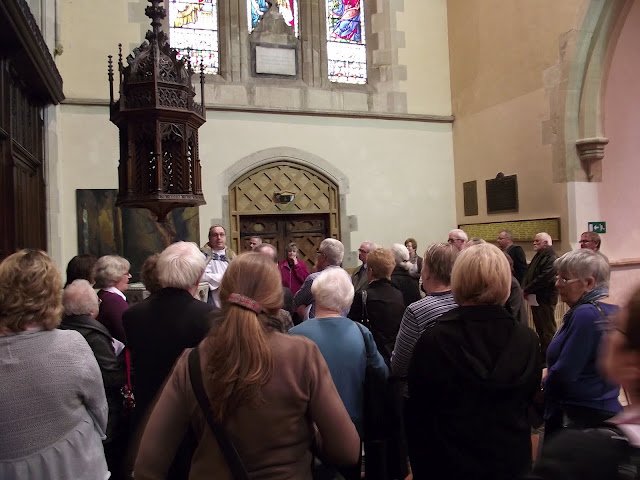I’m grateful to those who have commented on the post I put up on Monday regarding the order in which it might be thought proper to receive the sacraments. Particular thanks to Akma for the thoughtful post that he put up on his own blog about it.
Comments come in all over the place these days – it might be worth just noting a couple and my own response to them here.
Erp made the interesting comment that various Anglican churches honour Elizabeth Fry in their calendars and it seems to be the case that she being a Quaker would not have been baptised. That’s an interesting point and one that I’d not thought about. Can you have an unbaptised hero of the faith?
In a similar way, someone commented on twitter that Jesus said to the repentant thief that today he would be with him in paradise and that baptism did not seem to be an issue there. I’m guessing that Akma might well respond to that with the view that this was an utterly exceptional case from which it is pretty hard to make a general case. If he did, I’d have to say I’d agree with him.
However, I’m a bit troubled by something which Akma did seem to suggest which was that we could somehow note with rejoicing the unpredictable activity of the Holy Spirit blowing where the Spirit wills but at the same time apparently base our thinking about the church on Other Matters. I’m not sure I feel comfortable with that. It seems to me that if we believe that Pentecost matters, ecclesiology is inherently bound up with our pneumatology.
Much of Akma’s argument seems to be that specific instances of different practice in this area should not be used as a case for making a change to what has hitherto been the norm. I can understand that up to a point. However, I’d have to ask whether it is appropriate for the norm to be used to construct a prohibition on other possibilities.
Those who come to different conclusions about this question almost seem to pass as ships in the night, never really engaging with the issues which the other point of view raises. I suspect this may be because the argument is being played out in quite different playgrounds – the ethical and the more strictly theological.
Those who would favour a more open table are coming at this with ethical arguments. For example: Would Jesus have refused anyone communion who happened to be at the last supper on the basis of their baptismal status? (And yes, this is the point where that argument notes that he shared bread with Judas). [This is a ‘What Would Jesus Do?’ argument and they don’t always make for straightforward thinking, but it is an ethical argument all the same]. There seems to be more evidence of disciples baptising than descriptions of them being baptised.
There is a reason why it matters whether or not this is an ethical argument. Modern times seem to be making people less easy with deriving ethics from norms. Increasingly, modern people will assess each individual circumstance and make ethical judgements in the moment on the best evidence that they have that something is right. (Those who have recently been at my ‘Everything You Need to Know about Christian Ethics in 6 Cartoons’ seminar can see pictures in their minds right now). I see situation ethics being used to trump normative ethics left, right and centre and I only forsee that increasing.
Those on the other side seem to have more of a theological system that they want to defend and I’ve seen some folk who seem to think that lots of other things will come crashing down around their ears if this point is conceded. I find myself wondering whether the same things would have been thought to be at risk 30 years ago regarding Confirmation before Eucharist. Or indeed in some traditions Confession before Eucharist. Or Baptism before Marriage. Or Confirmation before Bellringing. (This is not a hypothetical issue – I was involved in looking at our bellringers’ guild constitution at the weekend which asserts that members of the Guild need to be confirmed, a point which is as honoured in the breach as in the observation).
Please don’t send me postcards and billets-doux telling me that Bellringing is not one of the sacraments of the church. I know. I know.
I don’t think, incidentally, that I can be found to argue in favour of the unbaptized receiving communion as an idea that carries any theological virtue. However, I do tend to want to say that we should welcome everyone to communion. That does seem to carry theological virtue. In any case, the idea that baptism should precede eucharist and the idea that everyone is welcome at God’s table are not polar opposites and it would trouble me to think that they might be seen to be.
I remember a quite heavy discussion once with someone about this during which I proclaimed that if anyone presented their open hands at the altar I would be unlikely to refuse them the host. The person who had just moments before declared that baptism must always precede communion looked me in the eye and said, “Well, neither would I. Of course I wouldn’t.”
I tend to take the view that Christians should do what they say and be truthful about what they do. And that gets me back to ethics. Melissa suggested that this issue is a “Don’t Ask, Don’t tell” kind of thing and I have a feeling she might be right. I’m not sure that I feel good about “Don’t Ask, Don’t tell” policies very often.
Do people who have different theological views about this issue actually have very similar pastoral ethics when the find themselves at Table?
If they do, then Akma’s raising of the issue of whether this is an adiaphoron is right on the button.

Recent Comments